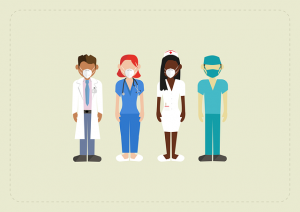
Electronic Medical Record System in Nigeria – All You Need to Know
The search for an electronic medical record system in Nigeria has significantly increased in the past year, especially among healthcare providers who are seeking improved service delivery and revenue.
Before digging deep, let’s clarify some things – EMR, EHR and HMIS.
Difference between EMR, EHR and HMIS?
The terms Electronic Medical Records (EMRs), Electronic Health Records (EHRs) and Health Management Information System (HMIS) are often used interchangeably and globally by virtue of sharing various similarities.
They’re all digital records of a patient’s health information from multiple doctors and provide a holistic, long-term view of a patient’s health. It usually includes the demographics, test results, medical history, history of present illness (HPI), and even medications/prescriptions.

They help make healthcare more efficient and less costly, but to go beyond basic clinical data and focus on the total health of each patient, you need a solution. Recently, the world has been full of surprises for the healthcare industry and the future of software solutions, in this case, for this blog, we’ll refer to them collectively as ” Electronic Medical Records (EMRs).”
The arrival of COVID-19 showed us just how valuable digital solutions are for solving numerous challenges facing healthcare institutions. Regardless of an EMR as a solution, a few individuals still have scepticism and understandably so as you can come across a lot of heartbreaks in this field.
A few of these challenges can come in the form of; the high cost of the desired or recommended software, past trauma from ineffective software solutions, excessive documentation, indecisiveness of what solution to go with, underdeveloped user interface/user experience for the software users and so on.
Notwithstanding these obstacles, the adoption of an EMR still maintains high relevance.
Why Adopt an EMR Software for Your Healthcare Facility?
Asides from helping your hospital keep up with the digital trend the Information contained in these solution systems allow relevant data such as patient demographics, progress notes, vital signs, medical histories, laboratory test results, diagnoses, medications, allergies, radiology images, immunization dates and administrative and billing data to be shared across the platforms and quick too for the seamless flow of your hospital.
-
Security as protecting e-health information is critical
Most software companies understand the sensitive nature of working with hospitals and keeping patients’ data confidential. EMR companies are compliant with standards that offer the highest security.
-
24/7 client support
EMR providers frequently give constant, ongoing support even after deployment to assist you in maintaining your newly acquired EMR. In addition to providing offline support, they might also provide support onsite. Many of them also include instructional videos, manuals, and support materials that detail how to deal with problems that can develop throughout the course of utilization.
-
Accurate Patient Information
Electronic record storage eliminates the possibility of sensitive data being stolen, lost, damaged, or altered. Digital records can also eliminate mistakes and errors brought on by illegibility and illegible handwriting. Physicians can also instantly update patient data, providing other healthcare providers with a current, accurate patient file.
-
Efficiency, these EMR options save time
They streamline appointments and office visits without compromising a patient-centred approach, driven focus enabling health professionals to see more patients each day and assisting with patient diagnosis and record interpretation.
-
Accountability of hospital staff
EMRs provide digital footprints of their users, by doing so, errors can be avoided as a lack of accountability in healthcare can cause significant damage. According to a study published in the Journal of Patient Safety, medical errors or hospital-associated infections cause the deaths of more than 210,000 hospital patients annually. EMRs can help your hospital staff be accountable.
Let’s do an illustration, let’s say there is a nurse named Sandra;
One of her roles is administering already prescribed drugs to patients on admission and updating vital signs and so she does this but due to her hospital previously running a semi-manual method of doing things (i.e., recording it on paper and later keying it into the EMR), she actually does the physical action but forgets to input it into the EMR and ends her shift for the day.
What do you think is going to happen to Sandra’s patient?
Another nurse on duty could administer a substitute drug that this patient is allergic to, or that nurse could fail to regard the previous failing vitals of that patient, e.g a low Body Mass Index (BMI). So, all these just to mention a few.
Conclusion
The amount and complexity of patient data and medical knowledge are increasing almost every day, putting today’s healthcare providers in the midst of an information explosion.
Although paper records have the advantages of being portable and familiar to users, they also have significant drawbacks that frequently annoy users and worsen inefficiencies in the healthcare system.
The effects of these restrictions are becoming increasingly noticeable as the healthcare system becomes more complex. The paper record can no longer meet today’s standards for patient care.
FOR MORE INFORMATION CONTACT US FOR MORE DETAILS ON +2348113637505 or you can also reach us here.

